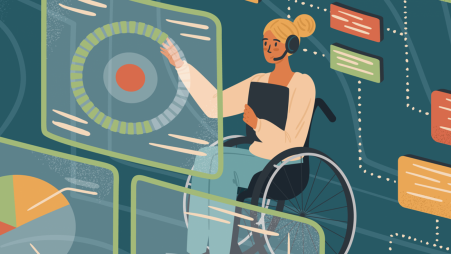Leveraging Artificial Intelligence for disability inclusion
In Bangladesh, the need for inclusive technologies becomes apparent when considering the prevalence of disabilities

In an era where technology is rapidly advancing, the integration of Artificial Intelligence (AI) stands as a beacon of hope for enhancing the lives of persons with disabilities. This integration is particularly significant in the International Day of Persons with Disabilities 2023, emphasising the theme 'United in action to rescue and achieve the SDGs for, with, and by persons with disabilities.' AI's potential to break barriers and foster inclusivity is immense, offering new avenues for empowerment and independence.
In Bangladesh, the need for inclusive technologies becomes apparent when considering the prevalence of disabilities. According to the National Survey on Persons with Disabilities (NSPD) 2021, approximately 2.80% of Bangladesh's population, equating to 47.42 lakh individuals, live with various forms of disabilities. However, the World Health Organization (WHO) estimates that the actual figure could be as high as 10-15%. This disparity highlights the challenges in accurately identifying and supporting individuals with disabilities.
The higher WHO estimate suggests a large segment of the population may not receive the necessary support, underscoring the urgency for inclusive technologies like AI. AI can play a crucial role in bridging these gaps, providing tailored solutions that accommodate a wide range of disabilities, thus ensuring no individual is left behind in the nation's progress. Bangladesh's commitment to disability rights is exemplified by the Persons with Disabilities Rights and Protection Act of 2013. This comprehensive legislation underscores the importance of accessibility, equal opportunities, and the right to live with dignity for persons with disabilities. It mandates reasonable accommodation and accessibility in public infrastructure, employment, and education, creating a legal framework for inclusivity.
However, the act's implementation faces challenges, particularly in integrating advanced technologies. AI can be a critical tool in realising the act's objectives, offering innovative solutions for accessibility and empowerment. By aligning AI development with the principles of this act, Bangladesh can ensure that technological advancements cater to the diverse needs of its population.
For individuals with visual impairments, AI-driven applications and devices offer revolutionary changes. Tools like voice-assisted AI and text-to-speech technologies enable better navigation and access to information. Similarly, those with hearing impairments can benefit from AI-powered hearing aids and real-time speech-to-text applications, facilitating more accessible communication. AI's role extends to learning and cognitive disabilities as well. Adaptive learning software, leveraging AI algorithms, can customise educational content, catering to individual learning styles and needs. This personalization is crucial in enhancing educational outcomes and supporting inclusive education.
Mobility is a critical area where AI can significantly contribute. AI-enabled smart wheelchairs, capable of navigating complex environments, promise greater user autonomy and safety. Advanced prosthetics and AI-driven exoskeletons increasingly mimic natural human movements, thus improving the quality of life for those with physical disabilities.
In the realm of daily living, AI integrated into smart home technologies empowers individuals to control their environment using simple voice commands or smartphone applications. This technology promotes independence in managing various home aspects like lighting, temperature, and security.
AI's application in healthcare can lead to early diagnosis and personalised treatment plans, which are especially beneficial for persons with disabilities. By analyzing vast amounts of medical data, AI algorithms can detect patterns and anomalies, assisting in accurate diagnoses and effective treatment strategies. In rehabilitation, AI-driven robotic systems provide tailored physiotherapy, adapting to each individual's progress and specific needs. This personalisation is key to effective rehabilitation and recovery processes.
AI also opens new vistas in employment for persons with disabilities. AI-enhanced remote working tools can make workplaces more accessible and inclusive. By automating routine tasks, AI allows individuals to focus on their strengths, enhancing employability and productivity. This shift not only benefits individuals with disabilities but also contributes to a more diverse and inclusive workforce.
While the potential of AI is vast, it comes with its set of challenges. Addressing the digital divide is crucial to ensure that AI technologies are accessible to all, avoiding further exclusion of marginalized groups. Moreover, ethical concerns such as data privacy and AI bias need careful consideration to ensure responsible and inclusive use of these technologies. As we mark the International Day of Persons with Disabilities in 2023, integrating AI to support persons with disabilities is a technological advancement and a step towards a more inclusive society. In its journey towards a disability-inclusive Smart Bangladesh, Bangladesh can leverage AI to ensure that every citizen, irrespective of their abilities, can thrive and contribute meaningfully. AI's thoughtful and inclusive application can dismantle barriers, offering a future where technology empowers and includes everyone.
Vashkar Bhattacharjee, a person with visual disability, serves as the National Accessibility Consultant for a2i.



 Keep updated, follow The Business Standard's Google news channel
Keep updated, follow The Business Standard's Google news channel















